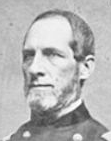 Open main menu
Open main menu
 Open main menu
Open main menu

HEADQUARTERS GIBBON'S BRIGADE,
Camp near Sharpsburg, Md., September 20, 1862.
Lieutenant FRANK A. HASKELL,
Acting Assistant Adjutant-General.
DEAR SIR: I most respectfully submit to you the following report of the part taken by the Nineteenth Indiana Volunteers in the battle of the 14th instant at South Mountain:
On the evening of the 13th we encamped 2 miles southeast from Frederick, Md. We left camp soon after sun-up, marched through Frederick, took the road toward Hagerstown, and marched 12 miles. On arriving near South Mountain, it was ascertained that the enemy was in force on the mountain and in the pass. I was ordered to form a line of battle about 3 o'clock p. m., which was done on the hill facing the mountain. Remained there until about 5 o'clock, when we were ordered to go forward. We went forward in line of battle on the left of the pike leading through the pass, supported by the Second Wisconsin, two companies of which (commanded by Captain Colwell) had been deployed as skirmishers. I also deployed Company B, Captain Dudley's, as flankers, to protect our left flank. We moved slowly and cautiously, but steadily, forward. The skirmishers were soon fired on, but pressed forward with caution.
On arriving near a house on our extreme left, surrounded on the southwest and north by timber, I discovered large numbers of the enemy in and around the house. They had been annoying us as well as the skirmishers by firing from the house and outhouses; also from the woods near the house. I ordered Lieutenant Stewart, who commanded a section of Battery B, Fourth Artillery, to come forward and open fire upon the house. He moved forward his section of two pieces and threw several splendid shots, the first of which took effect in the upper story, causing a general stampede of their forces from that point, enabling us to go forward more rapidly, and with less loss from their sharpshooters. Their skirmishers soon opened a sharp fire upon ours, which made it necessary for us to push forward. We then opened fire on the enemy at short range, who were concealed in part under cover. The fire became general on both sides. The Nineteenth gave a shout, and pressed forward - continued a steady step forward, cheering all the time. It was a most magnificent sight to see the boys of the Nineteenth going forward, crowding the enemy, cheering all the time.
After driving the enemy about three-quarters of a mile, I discovered a stone fence in-front, which the enemy had fallen back to. At that point they were annoying us very much. I then ordered Captain Clark, Company G, to wheel his company to the left, and move by the right flank until he could command the line of battle lying directly behind the stone fence. They then opened a flank fire upon the enemy, causing them to retreat precipitately, which gave us an opportunity of pouring upon them a raking fire as they retreated. Captain Clark here took 11 prisoners - 1 major, 1 captain, and 1 lieutenant amongst them. The firing then ceased in front of us. The Second Wisconsin came to our support promptly as soon as the firing became general, and stood by the Nineteenth until the enemy fled over the mountain. After the firing ceased in front, we discovered the enemy, who was concealed behind a stone fence on the right of the pike, in front of the Seventh Wisconsin, annoying them by a deadly fire behind their breastworks. Colonel Fairchild, commanding Second Wisconsin, wheeled the left wing of his regiment, and opened an enfilading fire upon the enemy. After exhausting their ammunition, he withdrew them and ordered up his right wing to take their place, in which position they remained until they exhausted their ammunition, when they were withdrawn. I then took forward my regiment and occupied the same position, and continued an enfilading fire upon the enemy, who soon fell back from their strong position, the Wisconsin and Indiana boys giving three hearty cheers as the fate of the day was thus decided.
It was then after 9 o'clock in the night, and pursuit being considered dangerous, we lay down on our arms, holding the battle-field. Small detachments of my command were now engaged in bringing in wounded prisoners. We held the field until about 12 o'clock, when we were relieved by fresh troops. The loss in the Nineteenth Indiana was 9 killed, 37 wounded, and 7 missing, making an aggregate of 53.
It was a glorious victory on the part of General Gibbon's brigade driving the enemy from their strong position in the mountain gorge. The boys of the Nineteenth Indiana behaved most gloriously. Too much praise cannot be bestowed upon them for their courage and gallantry. The officers were active in the discharge of their duties. Lieutenant-Colonel Bachman was very efficient on this occasion, rendering me important service.
Very respectfully, your obedient servant,
S. MEREDITH,
Colonel Nineteenth Indiana Volunteers.
Source: OFFICIAL RECORDS: Series 1, Vol 19, Part 1 (Antietam - Serial 27) , Pages 249 - 250